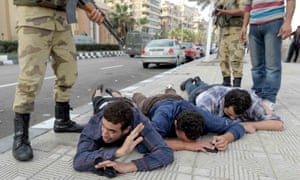 “These are the terrorists,” says Amani Othman, showing a mobile phone video of her two sons playing ping pong while on holiday in Kuwait.
“These are the terrorists,” says Amani Othman, showing a mobile phone video of her two sons playing ping pong while on holiday in Kuwait.
Sitting in a Cairo coffee shop, Othman giggles at the idea her boys could truly be extremists. But both Omar and Ahmed, seen in the video joking around as they hit the ball back and forth, are in an Egyptian prison where they have been awaiting trial for nearly two years. Omar, the eldest, is one of 170 defendants facing a litany of charges connected to ideological and financial support for Islamic State. Her younger son is accused of “belonging to a banned group”.
Their family and lawyers say they are innocent, and claim the same is true of many others on the charge sheet. Omar and his fellow accused had their case – number 247 – transferred to a military court earlier this year, which means the trial will be held in secret and the sentences cannot be appealed.Young detainees are often at risk of spending much of their lives languishing in Egypt’s labyrinthine prison system on vague and unclear charges. So many students are on trial in case 247 that families and lawyers are campaigning for them to be allowed to take their exams in prison.
Case 247 shows how the Egyptian authorities are responding to the growing threat of Isis in their country. A sweeping crackdown has targeted thousands of people, often in areas where there has been support for the Muslim Brotherhood group, which was once the ruling party but has since been branded a terrorist group and banned.
Observers argue that the Egyptian authorities’ desire to conflate the Muslim Brotherhood with Isis has created dangerous ambiguities. Since the overthrow of Islamist former president Mohamed Morsi in 2013, Egypt has run a campaign of arrests against both groups. At the same time, the country has positioned itself as a vital regional partner in the fight against Isis, a stance welcomed by the Trump administration.
In summer 2015, Omar, 23, disappeared while on holiday in Kuwait. The Kuwaiti authorities told his family he had been arrested, at the request of the Egyptian authorities, for “an electronic crime”. They assumed this meant posting incendiary messages on Facebook.
Omar was covertly transported back to Egypt where, after several months, his family were able to trace him to Cairo’s Lazoghly prison.
So many people have been jailed on political or spurious charges that the government has had to build 16 new prisons. Only China and Turkey jail more journalists than Egypt, which also blocked new websites.“It is very likely that in Egypt, as in other countries targeting Isis sympathisers, the wide net cast may have caught people who either had little to do with the charges or were simply expressing radical views – or what the government sees as radical views – online,” says Mokhtar Awad, a research fellow working on extremism at George Washington University.
“The wider the net is cast, the more difficult the process gets, because there would be simply too many people to properly assess. As a result, some fall through the cracks and leave from prison straight to Isis.”.
No comments:
Post a Comment